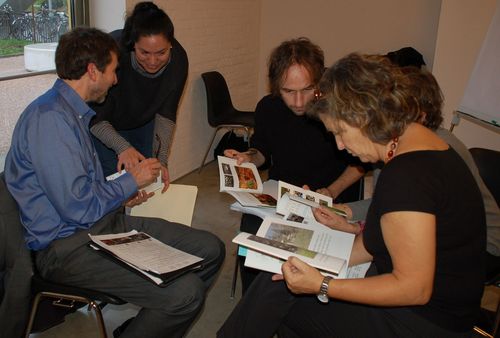On Documentation

On the eve of Thanksgiving, one of the many things I’m thankful for is my work at Opal School and the Museum Center for Learning. One of the many things I appreciate about this work is the way it has led me to investigate the approach to teaching and learning spearheaded by the people of Reggio Emilia. One of the many gifts the municipal pre-primary schools of Reggio Emilia offer the world is in conceptualizing, articulating, and demonstrating the vital role of documentation in the teaching and learning process. As I read through my notes from my trip, I stitch together a tapestry of ideas about the range of ways in which documentation guides our work.
Documentation…
- Makes thinking visible, which gets people curious, passionate, and talking
- Reveals children’s learning processes, which challenges us to develop contexts that are consistent with that process
- Encourages us to pay attention to what we as teachers do and what we don’t do by illustrating the choices we made and environments we developed
- Keeps us present to the interaction we’re living in – planning contexts while playing in contexts, a continuous source of ongoing reflection
- Preserves listening as a basic structure of schools
- Grounds discussions about learning in something concrete
- Gives value to diversity and the complexity of teaching and learning
- Helps teachers evaluate their role and influence
- Generates a sense of participation and empathy with children – which is “the enemy of indifference”
- Supports research as an attitude of daily life wherein daily life is the learning book.
One striking thing about the schools in Reggio is the documentation history covering the walls. In contrast to Opal School – where classrooms need to be cleared out annually the moment symposium ends in order to make room for the Portland Children’s Museum’s summer programs – the schools of Reggio Emilia have panels representing decades of experimentation and observation. This provides a sense of historical perspective for teachers, children, and families: It makes clear that what is happening at the moment comes within the context of experiences past and future. In so doing, it increases the sense of importance for all while concurrently building the opportunity to reflect on change over time. As Tiziana Filippini told our study group, We have a point of view that has changed over time – it would be terrible to not change over 50 years. When we gathered with long-time teachers at Bellelli center, one of our group asked, How has your thinking changed over the long time you’ve been here? What a gift to have representations of those decades surrounding those teachers constantly.
It was an honor to study documentation with the teachers, pedagogistas, and atelieristas of Reggio Emilia, long term scholars of the process from Project Zero, and colleagues from children’s museums who are collectively struggling with thinking about how they can embrace the documentation process. I walked away with an idea about documentation that was both very simple and new to me: Effective documentation makes visible both children’s thinking and the relationships, environments, and surrounding experiences that provided the context for that thinking.
I wonder:
How are you struggling with documentation?
How are you making visible both children’s thinking and the contexts which support that thinking?
How are you keeping the history of your learning centers visible to their present inhabitants?


